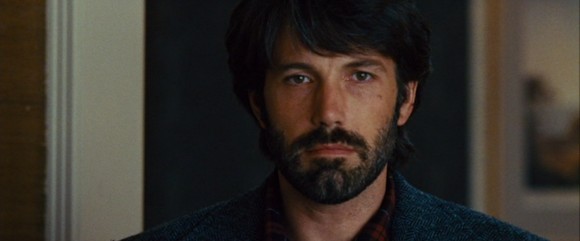As I watched Argo in the theater for the first time, I was willingly and enjoyably manipulated by the film to feel a sense of exhilaration and relief on behalf of the diplomats as they finally cleared Iranian airspace after a harrowing escape from Iranian police and Revolutionary Guards. On reflection, however, that “harrowing escape” proved just a bit too much. I concluded that what had been a tight political drama was ruined by a farcical Keystone Cops (Mehrabad Airport Edition) sequence that negated the credibility the film had built to that point.
But consider also that the tension that led up to the final escape was not the only thing that was manufactured. So was the exhilaration and relief itself. Screenwriter Chris Terrio spoke to the exigencies of the creative process in Hollywood: “There is a catharsis when the plane takes off. To create that in cinematic form requires a lot of amp-up and drama to replicate what the house guests might have felt at that moment.” (1)
Perhaps the six diplomats who escaped did feel “exhilaration and relief.” Or, perhaps just relief. Or, perhaps that relief was mixed with more than just minor twinges of concern for the Iranians they were leaving behind. Or concern for the colleagues they were leaving behind. What we think we know from Argo is that the six diplomats (and the rest of the hostages) were simply terrified and confused in the midst of rage and hostility, and were not only relieved, but exhilarated to leave that madness behind. What we don’t know from Argo is if any of them felt concern, even regret, over their complicity with an American government that had for so long taken advantage of a Middle Eastern country.
A movie is a con game. What’s at stake is not our money (popcorn prices notwithstanding), but rather exactly what the name of the game implies – our confidence. In other words, our complete trust that the film will pay off, intellectually, but more important, emotionally. Argo seems to be aware that its game is in some ways similar to the game it depicts – the one on the international stage by diplomats, heads of state, spies, and ideologues. The tradecraft of espionage demands that the diplomats give their handler their complete trust, as well as maintain the highest confidence in themselves. The process could not provide a better training ground for actors, writers, directors, or producers seeking to perfect their craft, but the stakes are far higher than the emotional damage that one might suffer from reading a withering review.
 But before I cast too much blame on the film again for snookering its audience, I want to take a look at the mark. The confidence game, after all, plays not just on one’s greed, but also on one’s psychological desires – to be well-liked, for example, or to “feel good.” We make a psychic investment in a film when we identify with the hero’s cause. Argo plays on our desire to identify with “American diplomats in peril,” and on our desire to feel that vaguely patriotic stirring when, upon clearing Iranian airspace, an announcement that alcohol may be served signals their official escape into the West. We, like they, congratulate ourselves on a job well done.
But before I cast too much blame on the film again for snookering its audience, I want to take a look at the mark. The confidence game, after all, plays not just on one’s greed, but also on one’s psychological desires – to be well-liked, for example, or to “feel good.” We make a psychic investment in a film when we identify with the hero’s cause. Argo plays on our desire to identify with “American diplomats in peril,” and on our desire to feel that vaguely patriotic stirring when, upon clearing Iranian airspace, an announcement that alcohol may be served signals their official escape into the West. We, like they, congratulate ourselves on a job well done.
There is a concept in literary and rhetorical criticism that goes by a couple of different names – the “implied author,” for Wayne Booth, or the “first persona,” for Edwin Black. (2) The basic idea is that we can infer a certain figurative image of an author from a work of literature or film, an image to which we can then ascribe a particular ideology. The interesting thing about this figurative image is that, while it allows us to see the work as the result of a thinking, creative entity, it doesn’t necessarily refer to any one person – we need not hold the actual author accountable for the ideological message of the work his or her name is attached to. Thus, the theory allows us to understand that a work of film, literature, or art is a site of a diversity of meanings, values, and perspectives.
In watching Argo, the stakes for the spectator may not seem to exceed the price of a ticket, or a six dollar small popcorn. But the psychic and emotional investment the spectator makes attests to something more important, especially when it comes to a political thriller that is based on actual historical events. It attests to our connection and attachment to the cultural and political milieu we find ourselves in. As both the director and the star who played CIA agent Tony Mendez, Ben Affleck authors Argo on many different levels. But I think we must also look at the responsibility we bear for the culture and politics we see reflected on the screen.
[1] Brian D. Johnson, “Ben Affleck Rewrites History: ‘Argo’ Shifts the Spotlight From Ken Taylor, our Man in Tehran, to CIA Spy Tony Mendez.” Maclean’s, September 12, 2012, http://www2.macleans.ca/2012/09/12/ben-affleck-rewrites-history/ (emphasis mine; accessed October 22, 2013).
[2] Wayne C. Booth, The Rhetoric of Fiction, 2nd ed. (University of Chicago Press, 1983), see esp. 67-77; Edwin Black, “The Second Persona,” Quarterly Journal of Speech 56, no. 2: 109–119.








